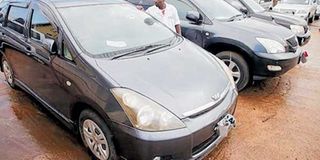Ride-sharing companies upset car rental industry

Reports show that Uber Tanzania rates are set at Sh466 per km while rental cars used to charge in dollars per drop or specific time of renting. PHOTO | FILE
Dar es Salaam. The car rental industry faces stiff competition from ride-sharing services.
The coming of Uber, Taxify and the likes expanded the choice of expatriates and company executives who needed to outsource transport services, putting more pressure on car rental firms.
Car rentals involve hiring of automobiles by individuals or corporate firms for short periods of time for a fee.
Car rental agencies primarily serve people who have a car that is temporarily out of reach or out of service, for example travellers who are out of town or owners of damaged or destroyed vehicles who are awaiting repair or insurance compensation.
The companies rent a variety of vehicles including vans, cars and even buses.
Although some car renting companies claim to remain unshaken, others confirm to have experienced revenue declines in recent times.
“Within a week, three cars could generate at least Sh2.1 million when hired but currently the same number of cars can hardly make between Sh600,000 and Sh900,000 per week,” says JB Car Rental executive director Jastas Jasson.
According to him, nowadays it is rare and difficult to have reliable customers because most of them opt for taxi-hailing operators, which offer lower prices.
Reports show that Uber Tanzania rates are set at Sh466 per km while rental cars used to charge in dollars per drop or specific time of renting.
MK Kings Car Rental treasurer Yusuph Omary says his company offers pick-and-drop services, but these have so far experienced a slight drop as some of their clients had switched to Uber and Taxify services.
According to him, even if they try to reduce or set fees that were similar to those of Uber and Taxify, customers don’t choose them.
“Even people visiting the country also opt for the taxi-hailing services. This has slightly shaken our business though, not very much because we have other services we offer.”
Mr Omary says his company also leases cars for weddings and transportation of equipment for construction of development projects.
However, PD Tours International director Derick Godian told The Citizen that taxi-hailing services had not brought any harm to their business.
He said though most car renting business complain about poor business, their business was going on well.
“We have not lost any of our customers. We have not encountered or noticed any pinch because most of services that we provide are on agreements. Most of our clients are corporate,” he says.
He stresses on several occasions they sign contracts of three to six months with companies and this makes them easier to run their business.
Uber, Ping and Taxify are currently competing in Tanzania and Kenya’s Little planning to launch its services soon.
Global situation
According to a new report from digital marketing firm Epsilon-Conversant, car rental companies are quickly losing customers to rideshare services.
In an analysis of $140 billion of travel transactions over the past two years, 63 per cent of previous car rental customers reduced their spending on car rentals—almost a $3.2 billion loss. Moreover, 56 per cent stopped using car rental services altogether, with most of these customers moving to rideshare services.
These services include Lyft and Uber which are frequently used.
Car rentals, meanwhile, are retaining a loyal demographic of older individuals, says Epsilon-Conversant‘s report, leaving room for these companies to capture market share presented by younger travelers.
Uber is a decade old now, and top car rental companies have started to make changes to remain competitive: Avis is moving to implement technology into the rental process, easing the exhausting lines outside airports. Hertz offers car rentals to Uber and Lyft drivers directly, hoping to lure drivers with savings on car maintenance, additional insurance, and mileage. Enterprise, meanwhile, offers a vanpooling service to lessen the carbon footprint of commuters.
While 9.8 million consumers use car rentals but don’t use rideshare services, the report says, there’s still 9.4 million more who use rideshare services but spend nothing on car rentals, meaning there’s still a long way for these companies to go.




